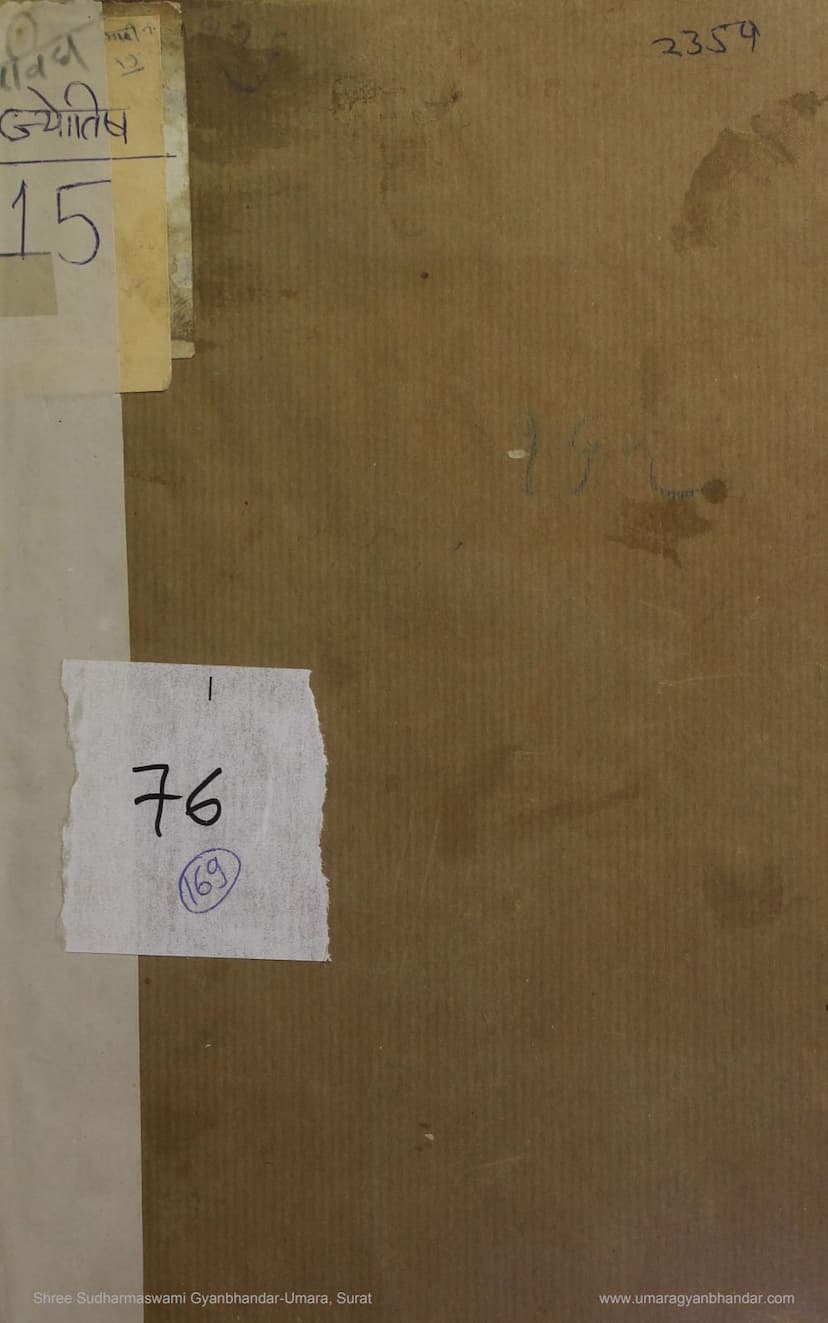Bhavkutuhalam
Added to library: September 1, 2025

Summary
This document is a scanned copy of the Jain text "Bhavkutuhalam" authored by Jivnath Shambhunath Maithil, with a Hindi commentary by Pandit Mahidhar. The publisher is Gangavishnu Shreekrushnadas, printed at the Lakshmi Venkateshvar Steam Press in Kalyan, Bombay. The catalog link provided is https://jainqq.org/explore/034482/.
Here's a summary of the key aspects presented in the scanned pages:
1. Title and Authorship:
- The book is titled "Bhavkutuhalam" (भावकुतूहलम्).
- The primary author is Jivnath (जीवनाथ), son of Shambhunath Maithil (शंभुनाथात्मजगणक जीवनाथ).
- A Hindi commentary (भाषाटीका) is provided by Pandit Mahidhar (पण्डित महीधर), a resident of Tehri (टिहरी).
2. Publisher and Printing:
- The publisher is Gangavishnu Shreekrushnadas (गंगाविष्णु श्रीकृष्णदास).
- It was printed at the "Lakshmi Venkateshvar" Steam Press (लक्ष्मीवेङ्कटेश्वर स्टीम् प्रेस) in Kalyan, Mumbai.
- The publication year is Samvat 1987 (संवत् १९८७), corresponding to Shake 1852 (शके १८५२).
3. Preface (Prastavna - प्रस्तावना):
- The preface highlights that during the era of oppressive Mughal rulers, astrology (Jyotish Vidya) was suppressed by foreign invasions.
- The author, Jivnath, a renowned astrologer of his time, composed "Bhavkutuhalam" to revive and make astrological knowledge accessible.
- The original Sanskrit text was difficult for many to understand, prompting Pandit Mahidhar to create a Hindi commentary for the benefit of beginners.
- The publisher mentions that this is the third edition, revised and published with the support of classical texts like Brihat Jataka.
4. Table of Contents (Vishayanukramanika - विषयानुक्रमणिका): The extensive table of contents reveals the detailed structure of the book, covering various aspects of natal astrology and predictive techniques:
-
Chapter 1: Samjna Adhyaya (संज्ञाध्याय):
- Mangalacharan (Invocation)
- Author's Introduction and Pledge
- Definitions of the Twelve Houses (Dwadash Bhav Sanjna)
- Significators of Zodiac Signs (Rashi Swaminah)
- Graha Maitri (Planetary Friendships)
- Planetary Exaltations and Debilitations (Graha Uchcha Neecha Kathanam)
- ShadVarga (Six Divisional Charts) Calculation
- Navamsa Calculation
- Planetary Aspects (Graha Drishti Vichar)
- Classification of Signs (Charadi Samjna)
- Types of Signs (Rashi Bhed Chakra)
-
Chapter 2: Jataka Chinha Jnana (जातकचिह्नज्ञान):
- Markings on the body related to birth chart indications.
-
Chapters 3-7: Focus on various astrological Yogas and their effects, including:
- Child's afflictions and remedies (Balakarishta Vichar)
- Parental afflictions (Pitra, Matri Arishta)
- Siblings' afflictions (Bhratru, Matul Arishta)
- Childlessness and loss of children (Putra Hani Yoga)
- Loss of spouse (Stri Hani Yoga)
- Remedies for afflictions (Arishta Bhanga Vichar)
- Progeny related Yogas (Putrakaraka Yoga, Santan Sankhya Vichar)
- Royal Yogas and their classifications (Nrupamukut Yoga, Samanya Raja Yoga, Sarvabhaum Yoga,atyutkrushta Raja Yoga, Sinhasana Yoga, Chatur Chakra Yoga, Ekavali Yoga, Shatru Vijaya Yoga, Kuber Tulya Raja Yoga)
- Specific yogas related to royalty and prosperity.
-
Chapter 8: Samudrika Lakshana (सामुद्रिक लक्षण):
- Physical characteristics and their astrological interpretations, including palmistry and physiognomy.
-
Chapter 9: Stri Jatakam (स्त्रीजातकम्):
- Astrology specific to women, covering marital life, progeny, widowhood, virtue, and other aspects.
-
Chapter 10: Kanya ke Shubh Ashubh Anga Lakshana (कन्यायाः शुभाशुभ अंग लक्षणानि):
- Detailed analysis of female body parts and their auspicious/inauspicious indications.
-
Chapter 11: Graha Avastha Vichar (ग्रहाणां अवस्था विचार):
- Planetary states of being (Shayana, Upaveshana, Netra pani, etc.) and their interpretation.
-
Chapter 12: Graha Pratyeeka Avastha Phalani (ग्रहाणां प्रत्येकावस्थाफलानि):
- Specific results of each planet in its various states of being.
-
Chapter 13: Graha Balaadi Avastha Phalani (ग्रहाणां बालादि अवस्थाफलानि):
- Results based on planetary states of childhood, youth, old age, exaltation, debilitation, etc.
-
Chapter 14: Maraka Vichar (मारक विचार):
- Identification of death-inflicting planets (Maraka) and their influence.
- Classification of houses as favorable or unfavorable.
- Calculation of longevity (Alpayu, Madhyayu, Dirghayu).
- Determining the timing of death.
- Royal Yogas (Raj Yoga) and wealth-creating Yogas (Dhanik Yoga).
- Poverty-creating Yogas (Daridra Yoga) and debt-creating Yogas (Rini Yoga).
-
Chapter 15: Bhava Vichar (भाव विचार):
- Detailed analysis of each of the twelve houses and their influences.
-
Chapter 16: Dasha Anya Nayan (दशा आनयन):
- Calculation of planetary dasas ( Vimshottari Dasa) and Antardasas.
- Detailed interpretation of the results of planetary dasas.
-
Chapter 17: Graha Garvitadi Bhava Adhyaya (ग्रहाणां गर्वितादि भावाध्याय):
- States of planets like 'Garbhita' (proud), 'Mudita' (joyful), 'Lajjita' (ashamed), etc., and their predictive results.
5. Content Highlights: The text appears to be a comprehensive guide to Vedic astrology (Jyotisha Shastra), covering:
- Foundational Principles: Astrological concepts, planetary relationships, sign lordships, exaltations, etc.
- Predictive Techniques: House analysis, planetary states, dasas (planetary periods), and yogas for various life events.
- Specific Areas: Detailed sections on progeny, royalty, wealth, health, relationships, and longevity.
- Samudrika Shastra: A significant portion is dedicated to the interpretation of physical characteristics, particularly for women, to predict their fortunes.
- Remedies: Implied in the discussion of afflictions and afflictions' remedies, suggesting astrological remedies might be discussed.
6. Historical Context: The preface by the publisher indicates the text's revival during a period when Hindu scriptures and knowledge were suppressed. The commentary by Pandit Mahidhar signifies its effort to make complex astrological knowledge accessible to a wider audience in Hindi.
In essence, "Bhavkutuhalam" is a classical Indian astrological treatise, enhanced with a practical Hindi commentary, offering detailed insights into predicting life events and characteristics through the lens of planetary influences and body markings.